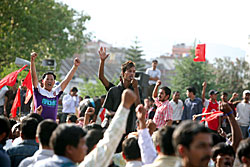 KIRAN PANDAY |
Their voices have been ignored because their languages are not used in education, administration and the media.
Many feel that federalism will divide the nation, but in fact its purpose is to unite. If we continue with the present system of central rule, it will be difficult to save the country's geographic unity. Thus we have to adopt a system of federalism that will address this issue of diversity and empower the marginalised communities.
Transforming Nepal into a federal state is no easy task. Every person, group, community and political party has a different view and there will inevitably be a clash of interests. Different groups lay claim to the same area.
Federalism is indispensable if we are to address Nepal's ethnic diversity. We have to explore the basis of federalism in language, culture, ethnicity, society, geography and history. We have to keep in mind the economic and administrative possibilities.
There are 93 languages spoken in Nepal, but only Nepali has received the designation of national language. Non-Nepali speaking communities have therefore been discriminated in terms of jobs, education and media.
Language is a social heritage and preserving a language means also preserving its community and culture. Language can be the means for developing education and for overall socio-economic transformation of a society. Language is therefore a vital basis for federalism. We have the prerequisites to establish language-based Mithila, Bhojpuri and Avadhi states in the Tarai-Madhes area.
In the hills, Nepali language is predominant, so federal states there should be based on ethnicity rather than language, like Limbuwan, Kirat, Tamsaling, Newa, Tamuwan and Magarat. Because the Tharus hold a majority in the Western Tarai, it might be possible to establish a Tharuwan state to ensure social justice. The areas in which there is no clear ethnic majority can have a mixed approach.
In the language and ethnicity-based states, two languages spoken by the majority, besides Nepali, should be used for official purposes. If there is a constitutional provision for this, we will be able to address the issue of diversity in language and culture.
There is a possibility that there will be a struggle for identity even within these provinces between ethnicities, in such cases we may have to establish further autonomous regions as well.
The 13 autonomous states proposed by the Maoists take language and ethnicity as their basis. The NC and UML also support such a system in their manifestos. Although NC and UML leaders have been proposing a geography based ethnicity, this has not emerged as a party decision. The MJF, TMLP and Sadbhabana party have been proposing 'One Madhes One State' which will have Hindi as the common language. But this will disregard the mother tongues of the Tarai and as a result will weaken the socio-economic transformation in the Tarai-Madhes.
Amar Kanta Jha is former central committee member of Tribhuban University Teacher's Association.


